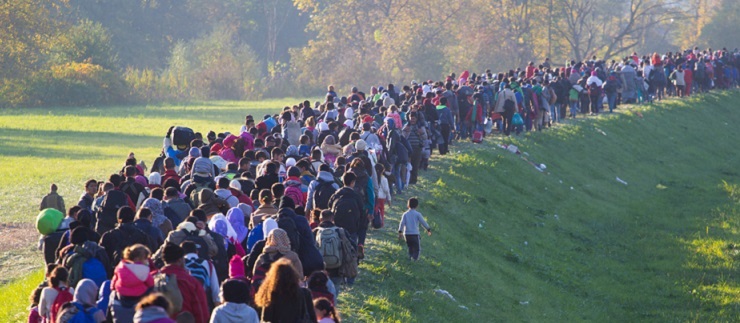CIVIL RIGHTS AND FREEDOMS
MIGRATION AND REFUGEE IN THE HUMAN SECURITY LANDSCAPE
ENERGY SECURITY. CHALLENGES WITHIN THE CURRENT CONTEXT OF INTERNATIONAL RELATIONS
ARTIFICIAL INTELLIGENCE – DRIVEN WARFARE. IMPACT ON CYBERSECURITY AND COMMUNICATION TECHNOLOGIES IN HYBRID CONFLICTS
CIVIL RIGHTS AND FREEDOMS
Coordinators/Moderators: Dragoș Dragoman; Andreea Zamfira
Contact: dragos.dragoman@ulbsibiu.ro; andreea.zamfira@ulbsibiu
Contact: dragos.dragoman@ulbsibiu.ro; andreea.zamfira@ulbsibiu

The last couple of years witnessed a sharp decline in the respect of citizens’ rights and the proper protection of their natural liberties. This is to be acknowledged all over the world, yet it is most striking in countries with a long tradition in fostering essential conditions for freedoms and rights to thrive. Whereas for decades the relationship between power elites and ordinary citizens has been a balance of prerogatives and duties that stemmed from the principle of representative democracy, the balance shifted roughly by favoring the concentration of executive power, monopolizing the public discourse and severely limiting citizens’ rights and freedoms. Not only independent opinions and free speech against the official narrative have been banned, yet other basic freedoms such as circulation, peaceful assembly and public participation under the form of protest have been limited or suspended. The speed and scope of those limitations represent a warning for the immense accumulation of power in the hands of a state bureaucracy, which impedes the natural ability of ordinary citizens to formulate opinions, to freely express, assemble, organize and balance state coercion. the panel welcomes papers on the logic and pace of recent limitations in civic rights and freedoms, on power state dynamics, on sensitive issues for citizens’ initiatives for protest, on the capacity of both ordinary citizens and more articulated secondary organizations to step out and defend civic rights and freedoms and on the legal actions taken by them. However, the range of issues is not limited to the previous enumeration and all other papers dealing with the protection of civic rights and liberties are equally welcome.
MIGRATION AND REFUGEE IN THE HUMAN SECURITY LANDSCAPE
Coordinators/Moderators: Iuliana Neagoș; Andreea Dragomir
Contact: iuliana.neagos@ulbsibiu.ro; andreea.dragomir@ulbsibiu
Contact: iuliana.neagos@ulbsibiu.ro; andreea.dragomir@ulbsibiu

A prominent source of threat to human security in general and in particular to Eastern Europe is represented by the continuous waves of refugees and immigrants, a phenomenon of maximum complexity, affecting the European status quo. It has strained the unity of the European Union, also posed difficult questions about global inequality and sparked debate about the differences between Western and Eastern Europe. Migration has become a top priority in various policy fields, migration has become a top priority, including foreign, security and development policy, directly related to all elements of human security. This panel aims to discuss the actual tendencies within the popular destinations in the regional migration flows on Eastern Europe, including the distinction between political migrants and economic migrants, according to the perspective of international law treaties. Recent displacement crises-from Syria or Afghanistan, and most recently Ukraine, have imposed huge tensions on the humanitarian protection regime. The conflict in Ukraine has caused destruction of the civilian infrastructures, civilian casualties, forcing people to flee their homes seeking safety, assistance and protection. Into neighboring countries, millions of refugees have crossed borders, and many more have been seen forced to move inside the country. In this extremely complex context, an institutional refugee response should be carried out.
ENERGY SECURITY. CHALLENGES WITHIN THE CURRENT CONTEXT OF INTERNATIONAL RELATIONS
Coordinators/Moderators: Marius Șpechea; Mihai Melintei
Contact: marius.spechea@ulbsibiu.ro; mihai.melintei@ulbsibiu
Contact: marius.spechea@ulbsibiu.ro; mihai.melintei@ulbsibiu

The geopolitical developments of the last two years in the context of the war in Ukraine have highlighted the importance of the energy field, both at geopolitical and strategic levels and as a fundamental element in the national security of states, with a direct impact on the dimension of human security. That is why we propose a panel dedicated to the energy field, which captures as much as possible of its profound and complex implications and which goes beyond the political and economic aspects, to address the aspects that primarily affect human security. The role of the nation-state and the dynamics of international relations from the perspective of the energy sector oblige us to an analysis of the complex interdependencies between state and non-state actors, such as large energy companies, as well as an analysis of the regulating role or not, of international organizations such as the EU, in managing the energy crisis. Then, the impact of new technologies, and tools for managing imbalances in the energy market, such as energy diplomacy or energy blackmail, are real points of interest for this panel. The road from hard power to hard energy, played by actors on the global stage, foreshadows a new type of geostrategy, namely energy geostrategy, whose implications with the suite of risks, vulnerability, but also opportunities are worth investigating.
ARTIFICIAL INTELLIGENCE – DRIVEN WARFARE. IMPACT ON CYBERSECURITY AND COMMUNICATION TECHNOLOGIES IN HYBRID CONFLICTS
Coordinators/Moderators: Nicoleta Annemarie Munteanu; Grațian Lupu
Contact: nicoleta.munteanu@ulbsibiu.ro; gratian.lupu@ulbsibiu
Contact: nicoleta.munteanu@ulbsibiu.ro; gratian.lupu@ulbsibiu

The interdependencies between the terms used to entitle this panel predispose to a multidisciplinary approach that addresses a wide range of specialists who are concerned about the dimensions of security from the military, political, social, cultural, environmental, human, or informational perspective, given the impact of artificial intelligence as an instrument of power, which converge towards the common element, the effects on human security. The main characteristics of hybrid warfare: asymmetry, synergy, ambiguity, the battle over psychology, and innovative disruption are related to artificial intelligence as an emerging technology, based on the recent developments in this field, which denotes that will have a big impact, in terms of potential and deterministic processing on strategic competition, military power, and world politics. Artificial Intelligence-driven transformation determines important international organizations to adapt, and to reach a level of consensus, including at NATO level; more than that, experts suggest that NATO`s members should initiate a NATO-mation vision (as a strategy for leading in the age of artificial intelligence), having the certain purpose to capitalize on their own technological and geo-economic advantages, also to address the emerging challenges. A totally new world is about to start since artificial intelligence, big data, and machine learning is constantly omnipresent. Technological progress is directly related to artificial intelligence, but there are certain aspects regarding bias and discrimination issues in AI systems, malicious online behaviors, and management of sensitive data. In terms of hybrid warfare, artificial intelligence will rise the offensive capabilities within information warfare through certain tools such as profiling the target audience, detecting reconnaissance activities, distortion in terms of fake news, and psychological operations, which will increase the impact of information warfare. The interdependency between artificial intelligence and hybrid warfare is only at the beginning of a mutual and influential process. Cyber-enabled information warfare, within the modern military campaign and below the threshold of war operations, is considered to be a core pillar in this situation.

Phone: +40771589870
E-mail: nicoleta.munteanu@ulbsibiu.ro
